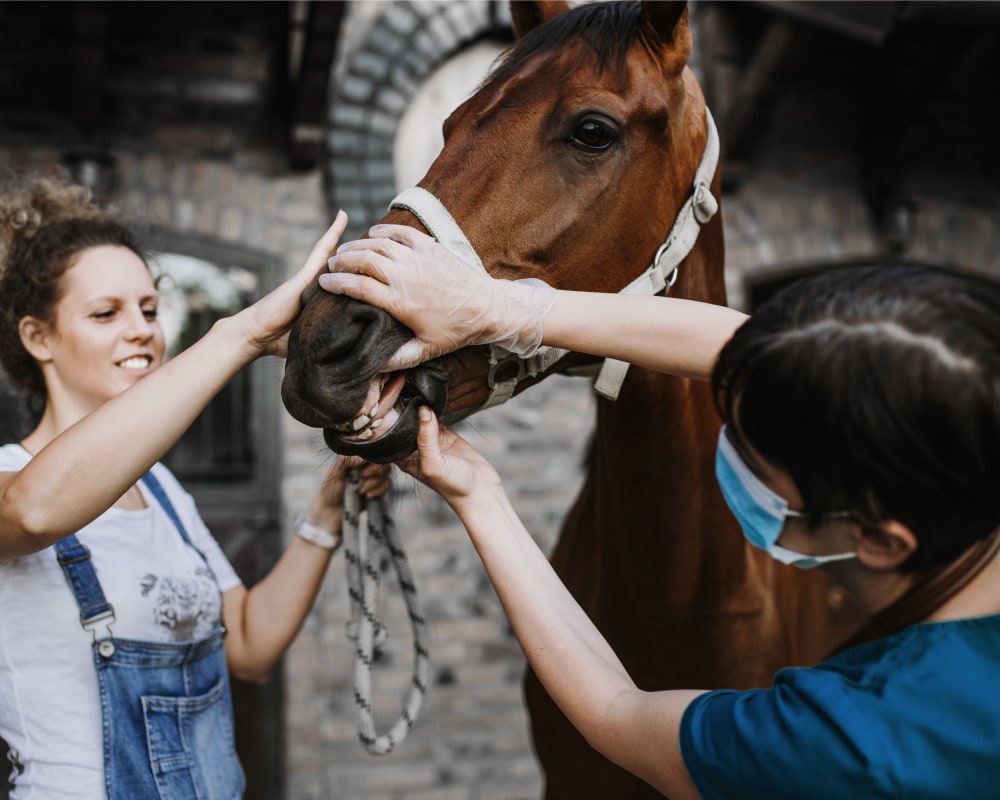Equine Emergency Support
We know it can be stressful for both you and your horse if they get injured or need emergency medical care in any way. That's why our team of veterinarians are here to support you during equine emergencies.
Using our range of available veterinary technology including testing equipment and supplies, we are able to quickly and accurately find the source of your horse's problem, and come up with a treatment plan quickly. We can also perform X-rays, ultrasounds, blood work, urinalysis, and fecal exams if necessary.
Whatever your horse needs, our team will do their best to help them and you through it.
For emergencies during our regular office hours, feel free to bring your horse to our clinic.

Managing An Equine Emergency
When your horse is experiencing an emergency, it's essential to act quickly but calmly. Read through the information below so that you're prepared should an emergency occur.
Steps To Take In An Equine Emergency
If your horse is experiencing a veterinary emergency, try to follow the steps below.
- Stay Calm - Your horse will react to your emotions. Staying calm is essential during an equine emergency.
- Stay Safe - Keep yourself safe at all times. You will not be able to help your horse if you become injured.
- Try to Keep Your Horse Calm - For your horse to feel calm and reassured it is essential for the people around your horse to also remain calm.
- Move Your Horse to a Safe Area - Move your horse to an area where they are unlike to cause further harm to themselves.
- Get Help from Others at Your Barn - Delegate responsibilities such as calling the vet, holding your horse, and bringing the first-aid kit.
- Call Your Veterinarian as Soon as Possible - Provide detailed information about your horse’s condition, including vital signs. Your vet will decide how to proceed based on the information you provide.
- Do Not Administer Drugs - Do not administer any drugs to your horse including tranquilizers or sedatives, without explicit instructions from your vet.
Emergency FAQs
Even if you've been our client for years if this is the first time you have contacted us for an emergency for your equine pet you are bound to have questions.
Read through our most frequently asked questions below to learn more about emergency appointments with our Van Roekel & Associates vets.
- How do I book an emergency appointment?
We handle equine emergencies at our large veterinary hospital in North Fort Myers Monday - Sunday 8am to 9pm.
If your horse is experiencing a health emergency call us straight away. A knowledgeable staff member will take your call during our regular business hours and arrange for one of our equine emergency vets to see your animal either at our state-of-the-art facility or at your horse's location.
- When is your veterinary clinic open?
Equine emergency care is also available at our hospital Monday - Sunday 8am to 9pm.
- What situations require emergency veterinary care?
Physical injuries are common in equine pets. While a range of sports injuries can occur during training, a horse's natural curiosity can also lead to serious injuries such as deep gashes and painful bruises. Physical injuries should always be seen by your veterinarian in order to prevent the injury from becoming infected or more severe.
Signs of gastrointestinal pain (often referred to as colic) can be an indication of anything from constipation to extremely serious intestinal twists or displacements. If your equine companion is showing any of the following symptoms call us right away for emergency care:
- Pawing at the ground
- Looking at their flank
- Kicking at their side
- Raising of the upper lip
- Lying down, rolling
- Sweating
Other equine emergencies include:
- Severe bleeding or bleeding that doesn't stop
- Obvious signs of pain or extreme anxiety
- Eye injuries
- Heatstroke
- Fever
- Choking, difficulty breathing, or continuous coughing/gagging
- Fractured bones or severe lameness
- Seizures
- Pregnancy problems
- Foaling difficulties
- Refusal to eat or drink
- Overall dullness
- Diarrhea
- Sports injuries (joint/tendon injury)
- Stiff movement or refusal to move
- Pale gums
- How long will we have to wait to see the vet?
Our North Fort Myers animal hospital is just like a human doctor's office—our caseload is always unpredictable. Call us as soon as possible if your animal is experiencing a medical emergency and we will do everything we can to have one of our skilled veterinarians see your horse as quickly as possible.
- What happens if my horse needs to stay in the hospital?
Some veterinary emergencies require intensive overnight care. If hospitalization is necessary our vets will determine the best option for overnight care. In some cases, your horse may be referred to another location.
- What other animals can you provide emergency care for?
At Van Roekel & Associates we can take care of the emergency needs of cats and dogs in our clinic during our regular clinic hours. Emergency Care for Cats & Dogs
Under extreme circumstances, we will help other farm animals who are experiencing signs or symptoms of an emergency. Contact Us

